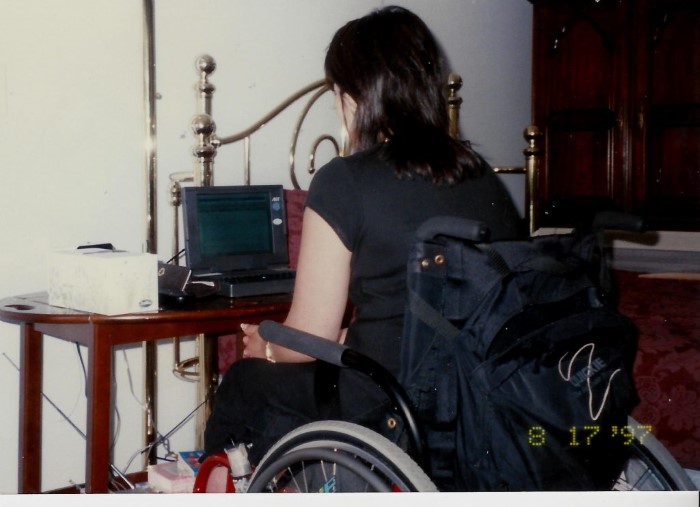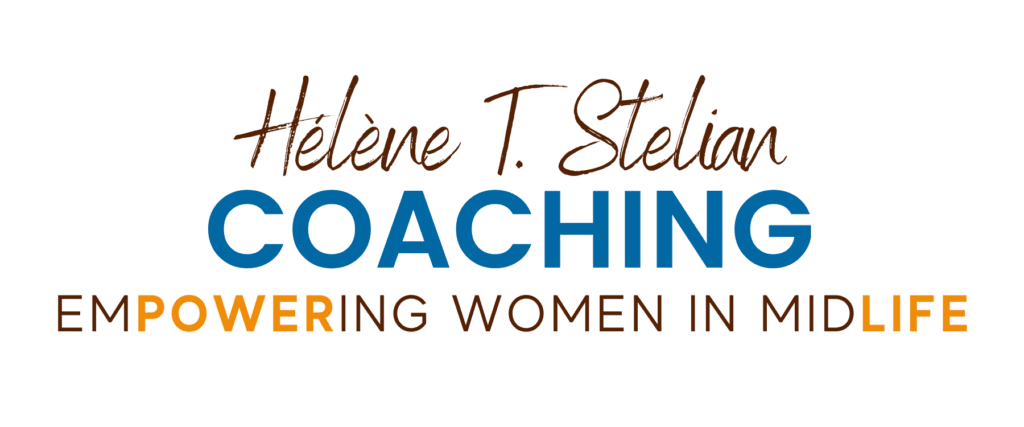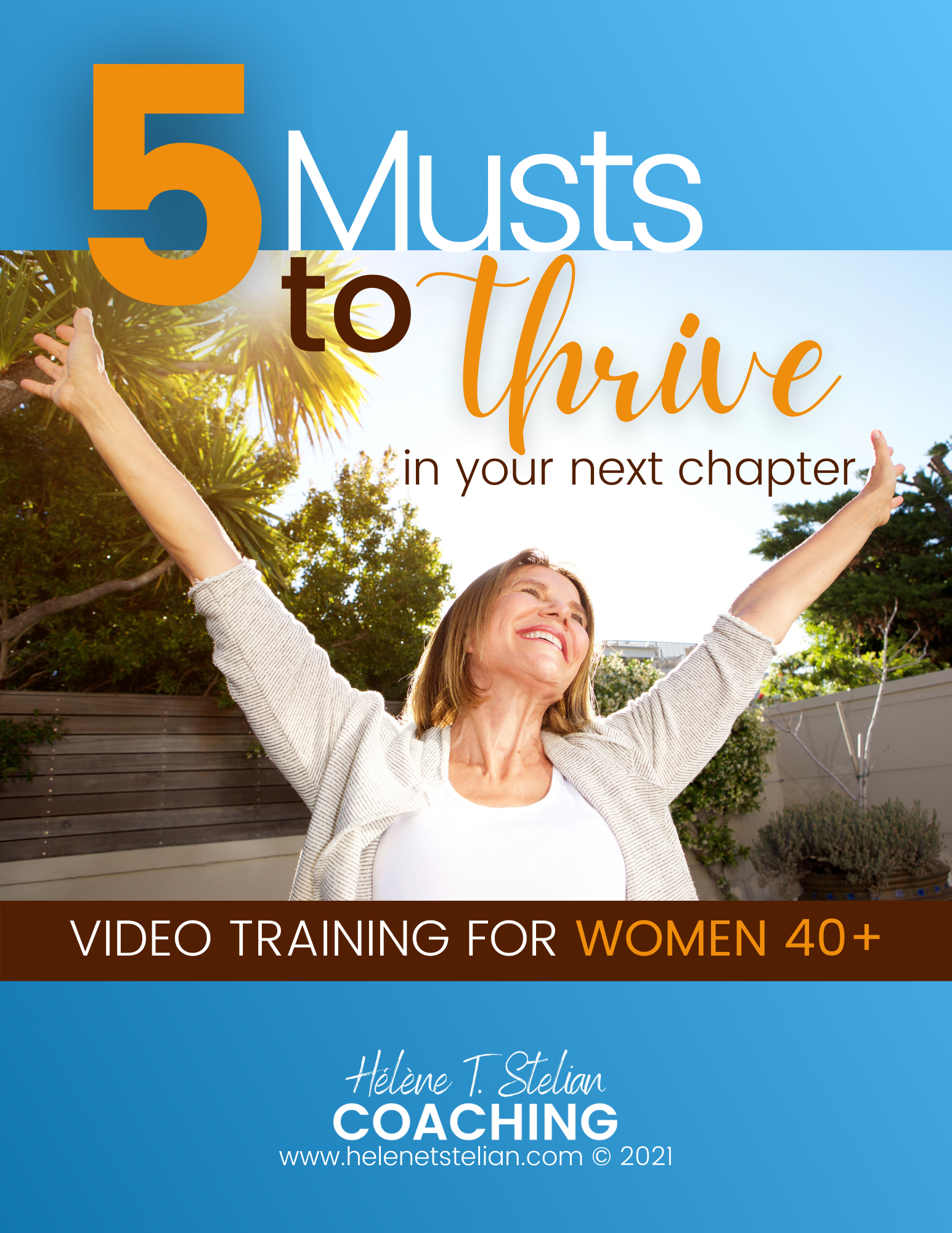 Suddenly paralyzed at 38, Becky found writing as a way to cope. In her new book, Rethinking Possible: A Memoir of Resilience
Suddenly paralyzed at 38, Becky found writing as a way to cope. In her new book, Rethinking Possible: A Memoir of Resilience, she shares her story of optimism and perseverance despite a series of life-changing losses.
Tell us a little about your background…
I’m a native North Carolinian, a PK (preacher’s kid) raised to be a winner, who enjoyed careers in sales and marketing but had to reinvent myself as a writer, something I’d never in a million years imagined I’d call myself—until I became one in a million.

Our family (I’m seated next to my mother)
On February 12, 1997, nine days after my divorce was final (yes NINE DAYS), I joined the ranks of the rare one-in-1.34 million people who go to bed with a flu-like illness and wake up with transverse myelitis (TM), an inflammation of the spinal cord that causes paralysis. I didn’t know it then, but I would never walk again.
My life was already crazy complex. As a 38-year-old mother of four—two with special needs that included autism and epilepsy—I’d coped with more than a few of life’s curveballs, including the accidental death of my seventeen-year-old brother when I was twenty. But I’d muddled through that horrific grief and had managed my kids’ issues well enough that I’d decided to end a marriage that wasn’t working. I was ready to begin again and find someone who wanted to share my nutty life with me.

With my kids, 90 days before my paralysis
But writing? Nope. Never part of this gal’s game plan. Writing was something my pastor father did. Finding meaning in life and all its unanswerable questions was his expertise. Sharing insights and a message of hope was his passion, his calling—not mine.
I was a survivor, not a writer. Until I had to write to survive.
Before my paralysis, I was a high-strung sales gal who ran on deadlines and quotas and way too much coffee. I loved to build customer relationships, close the deal, and win! I’d excelled early in my 10-year career with IBM and, after the kids were born, I was back in the trenches, doing marketing for an outplacement firm. I put my head down and l plowed through the hectic pace of working and raising a family.
Until I couldn’t. But paralysis cut through more than my mobility. It. Stole. My. Life.
Desperately, I wanted to connect with the world that had been taken from me. Soon, I found a way: Email. My timing was practically cosmic.

Working at my computer, 1997, six months after my paralysis
Remember Netscape Navigator? Erols? Those 1997 Internet dudes became my new best friends after an old high school buddy read about me in one of my father’s columns and sent me an email. His subject line was what I’d been wondering every day when I looked in the mirror, “Is That You?”
Eons before blogging became all the rage, my exchanges about my adjustments to life with paralysis soon blossomed into an email audience that spanned the globe. From Hickory, North Carolina, to Guangzhou, China, from my elementary school days through my last job with IBM, hundreds of family and friends asked me to email them about my life and wheelchair escapades.
And I did. One at a time. I treated those email addresses like they were 14K gold. My cyber-buddies told me my e-mails made them laugh—and cry—and inspired them in their own lives. One persistent fellow suggested I submit my story about playing soccer with my son to the Baltimore Sun. To my surprise, it was published in the fall of 2000. I was 42.
Then a local Weekly asked me to write for them and my first regular column, “From Where I Sit” was born. Two years later, my father asked me to continue his Sunday Op-Ed columns, “Looking Homeward,” and a few years after that, I began, “Tuesdays with Madison,” a column about my visits with my daughter with autism as she transitioned from her school to the adult community.

What is your next act?
So now, I am a weekly columnist and share my articles through my newsletter, Thoughtful Thursdays: Lessons from a Resilient Heart. I love it! In fact, the thing is, I can’t NOT do it. It’s how I cope. How I cut through all the craziness that is still in my world and get real about what matters. It’s how I stay connected, despite all the loss.
Since my first column in 2000, I’ve published over 400 pieces through those three monthly columns I am also a regular contributor to Nanahood.com and Midlife Boulevard.com.
And my next act is the rest of the story—my book, Rethinking Possible: A Memoir of Resilience. The book spans most of my life, from one family dinner table at age six to another family dinner table at age 54 and all the ups and downs in-between.
I was born into a family that valued the power of having a plan. As the eldest daughter of a preacher and a stay-at-home mom, my 1960s Southern upbringing was bucolic, even enviable, I’m told. But when my brother, only seventeen, died in a waterskiing accident, the slow unraveling of our perfect family began.
Though grief overwhelmed our family, at age twenty, I forged onward with my life plans―marriage, career, and raising a family of my own―one I hoped would be as idyllic as the family I knew before my brother’s death.
But life, as it often does, did not go according to plan!
There was my son’s degenerative, undiagnosed disease and subsequent death; my daughter’s autism diagnosis; my separation; and three years later, my divorce. Nine days after my divorce was final, I woke up with flu-like symptoms that turned out to be transverse myelitis, a rare inflammation of the spinal cord that paralyzed me from the waist down.
I would never walk again.
Despite the waves of life-changing loss, I’ve maintained my belief in family, in faith, in loving unconditionally, and in learning to not only accept, but also embrace a life that had veered down a path far different from the one I’d envisioned.
I wrote the book for those for those who may have loved deeply and lost dearly. Who are going through a tough time and may need some encouragement. Who want to believe that a full and meaningful life is possible despite some of life’s deepest losses. And are curious to see how one woman lives, laughs, loves, and heals enough to finally find it.
Life can be good, no matter what. I firmly believe. My book is about the power of love over loss and the choices we all make that shape our lives ―especially when forced to confront the unimaginable.

Becky with college buddies, 15 years after paralysis
Why did you choose this next act?
After my paralysis, writing connected me to people again, something I desperately missed. I tried going back to work for a brief time, but had medical complications and decided to stay home full time to give my body every chance possible to heal. Luckily, I could do this as my husband and I had made good investments while we were married, and he has been generous since our divorce.
For the first year, I had hopes of walking again since two-thirds of those with TM get some kind of recovery. But now that I’ve been paralyzed for 20 years, I’ve decided that any experimental offerings are not worth the risk to me. Stability means so much to me now. I have adjusted to wheelchair life and to be honest, I’m happy. I hate my wheelchair limits and would never ever pretend to be grateful for paralysis, but life is good now. I am comfortable and have people who love me and care about me.

My “stander” contraption
How hard was it to take the plunge? How supportive were your family and friends?
As I adjusted to the wheelchair life, I wrote from the heart as honestly as I could, sharing my thoughts and feelings. I had only a freshman English course, no creative writing or journalism classes so I was winging it. I knew no one in the writing community so my submissions were blind. My father was also a columnist so he reviewed my drafts and referred me to another editor who read everything I wrote and was supportive and helpful.
My family and friends LOVED my stories. They told me to keep writing and really enjoyed it when I landed on the Op-Ed page of the Baltimore Sun a few times. They encouraged me to write my book and many have worked with me in the editing process.
My kids, Brittany (29) and Peter (23), also enjoy my weekly columns, and are supportive of my memoir. They know writing keeps me busy and focused. When they were younger, I think it annoyed them because they never knew when they would be featured! I do run every article by them now if they are mentioned. No budding writers, though. Business-oriented kids.
And the Madison (age 25) columns (Tuesdays with Madison) have been some of my most popular ones. Her severe autism limits her—she does not read or write or understand the concept—but it has been a tremendous platform for educating readers about life with a child so severely affected.

Becky with Son Peter (23), Daughter Madison (24) Daughter Brittany (29), Son-in-law Brian (29), Grandbaby Blakely Faye (15 months)
Were there times when you thought about giving up?
Writing then was straight therapy. I wrote; people responded. It kept my mind active and engaged as well as gave me an outlet for my frustrations. Back in 1998, I lived for that “ding” of “you’ve got mail.” Still do now, with my weekly newsletter, Thoughtful Thursdays. I LOVE it when readers respond AND when they refer me and others sign up. Really makes my day! Wheelchair life can be lonely.
What did you learn about yourself through this process?
I’ve learned that we can be very inventive when presented with challenges if we allow ourselves to respond in earnest. That in midlife, we can rethink our past, our history, the things that we have accepted as fact about ourselves that may need to be challenged. I had a ninth grade English teacher who labeled my poetry as “maudlin,” a term that haunted me as I was writing about my wheelchair life. I learned to discount her opinion and put myself in places to learn from professionals (conferences, newspaper editors, classes, and book coaches).

Dancing at a friend’s wedding
Looking back, is there anything you’d have done differently?
No, not really. I think I learned so much from the struggle of writing and its reward as I went through it. In 1999, I had an agent for one version of my book. She dropped me after she could not get one of the large houses to sign on. I was devastated at the time, but now see it as part of the process. There’s no way I could have handled publication at that stage of my life with my young kids. It was hard to accept at the time, though.
What advice do you have for women seeking reinvention in midlife? What about writing advice and resources?
Slow down long enough to discover what interests you and then strengthen those interests through education and experience. Dabble before you do. And try to enjoy the process. Sometimes that is all there is for a while.
If you’re interested in writing, find the best program you can in your interest area and sample a class. Research like-minded writers and use social media to stay informed. There are tons of free webinars out there. Give yourself permission to graze a bit.
Great programs at Stanford Continuing Studies, all online.
Great blog from Jennie Nash on the book publishing industry.
Great newsletter from Dan Blank for creative professionals and finding your audience for whatever it is you write.
Great writing support services for writers looking to publish from Brooke Warner at Warner Coaching.

Book signing
What advice do you have for others who might become wheelchair bound in midlife?
- Move to your strengths: Remember to look hard at what is left in your life and keep trying new things.
- Examine your resources: Who and what is in your life that can be helpful to you. Find a website, blog, and Facebook groups who are specific to your disability, are reputable—and sign up!
- Get people in the boat with you: Create a team of folks whose expertise can help you.
- Let others help you: People like to help so if they offer, consider it a gift to them to let them help you.
- Keep positive people around you: Stay away from those who bring you down.
- Keep looking forward: Put something on the calendar to look forward to.
- Give yourself credit: When you accomplish something, celebrate it. I kept a diary and celebrated all the wheelchair firsts, even my first hot fudge sundae!
- Take time to be sad, but not for long: It’s ok to feel sorry for yourself on occasion. Get in a “pity pool” periodically, but don’t stay down there long. Make sure and let someone know when those times occur so you can celebrate getting back out!
- Help someone else: There is no finer joy than to feel like your struggle has helped someone else. For me, helping to found Pathfinders for Autism soon after my paralysis brought me tremendous satisfaction since I was able to help other parents who were struggling with the autism diagnosis. It kept me focused on something besides my paralysis, too, giving me a key element for healthy living–perspective.
- Find something to be grateful for: Even if it’s just the weather, find something to appreciate. We build positive outlooks with every grateful thought. Cultivate it purposefully. Daily.

Celebrating my Birthday with my family
What’s next for you?
I hope another book or two. I’d love to move my Thoughtful Thursday snippets into a “quiet time” book of inspirational thoughts and put together a matching daybook that combines calendar planning with journaling.
Contact Becky Galli at rfsgalli@gmail.com
Twitter: @chairwriter
Instagram: @chairwriter
Facebook: From Where I Sit
Rebecca Faye Smith Galli (Becky) is a weekly columnist and author who lives in Baltimore, Maryland and writes about love, loss, and healing. Surviving significant losses—her seventeen-year-old brother’s death; her son’s degenerative disease and subsequent death; her daughter’s autism; her divorce; and nine days later, her paralysis from transverse myelitis, a rare spinal cord inflammation that began as the flu—has fostered an unexpected but prolific writing career. In 2000, The Baltimore Sun published her first column about playing soccer with her son—from the wheelchair. With over 400 published columns, she writes, “Thoughtful Thursdays―Lessons from a Resilient Heart” – a weekly column for her subscriber family that shares what’s inspired her to stay positive. She also periodically contributes to The Baltimore Sun’s Op-Ed page, Midlife Boulevard, Nanahood, and The Mighty. Join her Thoughtful Thursdays family at www.beckygalli.com/signup. Her book, Rethinking Possible: A Memoir of Resilience, was published in June 2017.







Wow…what an incredible and inspiring story! Thank you for sharing your journey. You truly depict the definition of resilience. I look forward to reading your book.
Thank you, Sharon! It has been quite a ride. Please let me know what you think of the book! Thanks for taking the time to share your thoughts!
Fantastic interview. Added the book to my goodreads list. Looking forward to reading it.
Thanks, Leah! Looking forward to your thoughts.
Hi Becky – I thoroughly enjoyed reading your story. You truly are an amazing and inspiring women. Thank you so much for sharing your story on Next Act for Women. Helene always finds wonderful women to interview. I love reading the journeys of others. We’re all connected in one way or another. I am now going to SHARE your inspiring story on my Facebook page, then go to amazon and order your book. All Best Wishes to you.
Thank you so much, Cynthia! I will look for your Facebook page. Helene knows just the right questions to ask. What a delight to work with her. I look forward to reading more about others’ adventures in midlife. Many thanks for getting my book! Please let me know what you think.